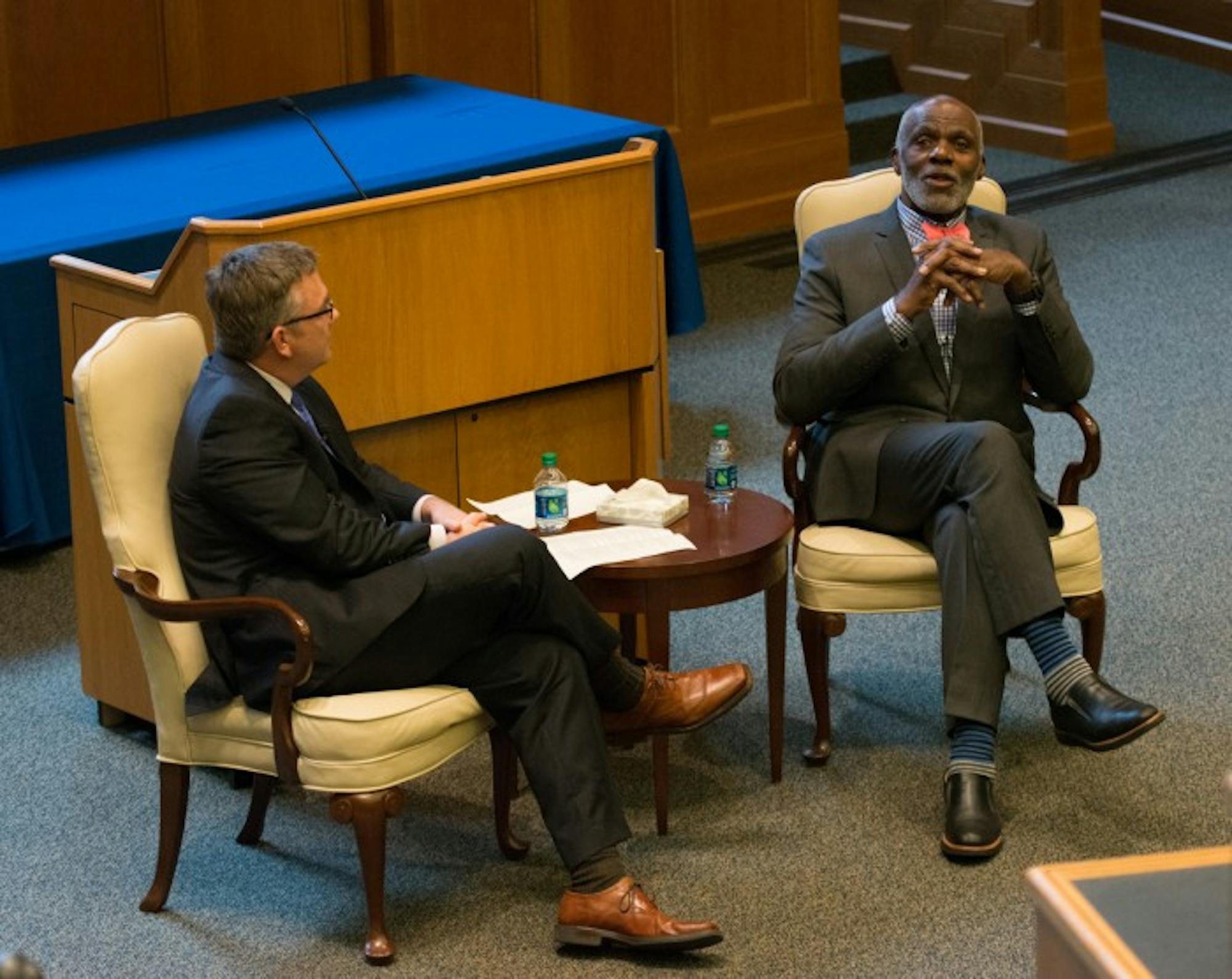Alan Page, class of 1967, was the first African-American to hold a major state office in Minnesota and in 2015, he retired from his position on the Minnesota Supreme Court.
Page is also a college All-American and Pro Football Hall of Fame member who was presented with the Monogram Club’s Moose Krause Distinguished Service Award as part of the club’s 100th Anniversary Celebration.
“Football wasn’t something I had planned and thought about,” Page said in a conversation at Eck Hall of Law with associate dean Mark McKenna on Thursday afternoon. “As a third, fourth, fifth grader, people would ask me what I wanted to do when I grew up and I said I wanted to be a lawyer. I didn’t know what lawyers did. I didn’t know any lawyers; I certainly didn’t know how you became a lawyer.
“Growing up in Canton, Ohio, in the 1950s for a young African-American kid, if things went really well, you might find a job in a steel mill.”
Having not played football until he was already in high school, Page did not draw upon the sport he excelled in as part of his identity.
“I didn’t see football as a career and I didn’t see myself as a football player,” he said. “I didn’t lose that excitement and enthusiasm for the law; in fact, I became involved in the NFL Players Association and that reinforced my desire to become a lawyer.”
In his second year in the NFL, at the start of the 1968 season, Page enrolled in law school.
“I was in over my head,” he said. “It was so bad that I decided to drop out. It was so bad, it took me another two and a half weeks to figure out how to drop out.”
In 1975, Page tried again, enrolling in the University of Minnesota Law School while still playing football professionally. This time, things were different.
“I loved every minute of it,” he said. “It was fascinating. It was hard, it was intimidating, it was scary; it was everything that [first-year law students] go through, but I learned a tremendous amount, not only about the law, but about myself.”
After retiring from football after the 1981 season, Page started his career in law, including spending five years in private practice.
“The private practice didn’t agree with me and I didn’t agree with it,” he said. “It was a bad choice in the first instance. Ultimately, private practice is about the law, but it’s about the business, and it wasn’t me.”
Unsatisfied with private practice, Page decided to run for a position on the Minnesota Supreme Court but was blocked from election by two last-minute appointments, prompting him to take his case to the Supreme Court, before he was able to get on the ballot.
“I can still hear it, it rings in my ears, the afternoon the decision came down: ‘He’s just a football player, he’s not qualified,’” he said. “The way that was stated, to me, was clearly a code for ‘he’s black and he’s not qualified.’ Fortunately, the people of Minnesota didn’t buy into that; they gave me 62 percent of the vote and gave me the opportunity to serve.”
As a justice, Page was adamant every case be considered with great care.
“My approach, ultimately, was every case was important,” he said. “Every case deserves 100 percent of my attention, my effort and my energy, because, even in those obscure cases that no one ever hears about or cares about, it involves real people with real problems. It involves people’s rights, people’s liberties; sometimes it involves people’s lives.”
While addressing student questions, Page commented on police and racial tensions in communities across America, including his own community in Minneapolis.
“The reality is, that when it comes to police-community relations, the police have some legitimate concerns and certainly communities of color have concerns,” he said. “We have, for far too long in this country, treated people of color differently when it comes to how the law is applied to them, particularly in the criminal justice system.
“We shouldn’t be surprised that they are dying at disproportionate rates, because we arrest them at disproportionate rates. It follows that bad things are going to happen and they’re going to happen at a higher rate.”













